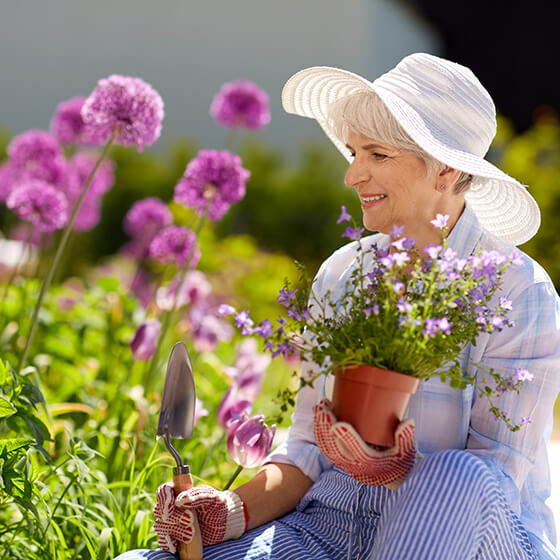As winter gives way to spring, and the earth loses its permafrost, gardeners find their way to their yards to cultivate their land. Gardening can be a practical way to connect with nature and build a relationship with the land. Spending time outdoors can be a great way to improve morale through the improvement of strength and stamina, and the reduction of stress. However, for people with dementia, it can also present unique safety hazards, so you should ensure you are taking the proper precautions before introducing them to the joys of gardening.
Tips for Creating a Safe Space for Gardeners with Dementia
Safe Tools
While most adults may have learned the basic safety rules in regard to gardening tools during childhood with their families, people with dementia may not remember those lessons. Dementia affects memory and cognitive processing, which may impede their ability to navigate dangerous tools. Therefore, having safe tools with rounded, non-sharp edges will minimize the threat of injury. As well, dementia affects fine motor skills so having accessible tools available with larger handles will accommodate their ability.
Non-Toxic Plants
A person with dementia may mistake outdoor plants for food, especially if it resembles regular food or has an appealing fragrance. This can lead to them eating plants that are not meant for human consumption. It can be especially dangerous if the plants are toxic, so planting non-toxic plants can be a safer option in case your loved one with dementia does accidentally eat it.
Physical Care
People with dementia may struggle with recognizing cues that their body is sending them. Heat exhaustion, dehydration and straining their muscles can be risks as they may not understand the cues their body sends them. Look out for excessive sweating, dizziness, and sudden weakness in limbs. It is beneficial to have a BPA free plastic water bottle available at all times and encourage them to drink from it regularly. Be mindful of the heat and the sun damage, and ensure they are wearing a hat and proper clothing. You may want to avoid gardening during hot days, and peak temperatures. As always, rest time is crucial, but especially for people with dementia as it can create mobility issues. Consider bringing a portable lawn chair or encourage them to take the time to rest often.
Gardening with a loved one with dementia can present unique challenges. However, you know your loved one best and by preparing safety-based options in advance, you will be more able to enjoy the precious time spent in nature with your loved one. Supervision is crucial when helping someone with dementia, so make sure you stay present with them during this time. Otherwise, if your loved one enjoys gardening and it does not suit your schedule, it may be convenient to hire a personal care worker to accompany them during their beloved hobby.
We also recommend you check these related posts in our Home Care Services blog:

